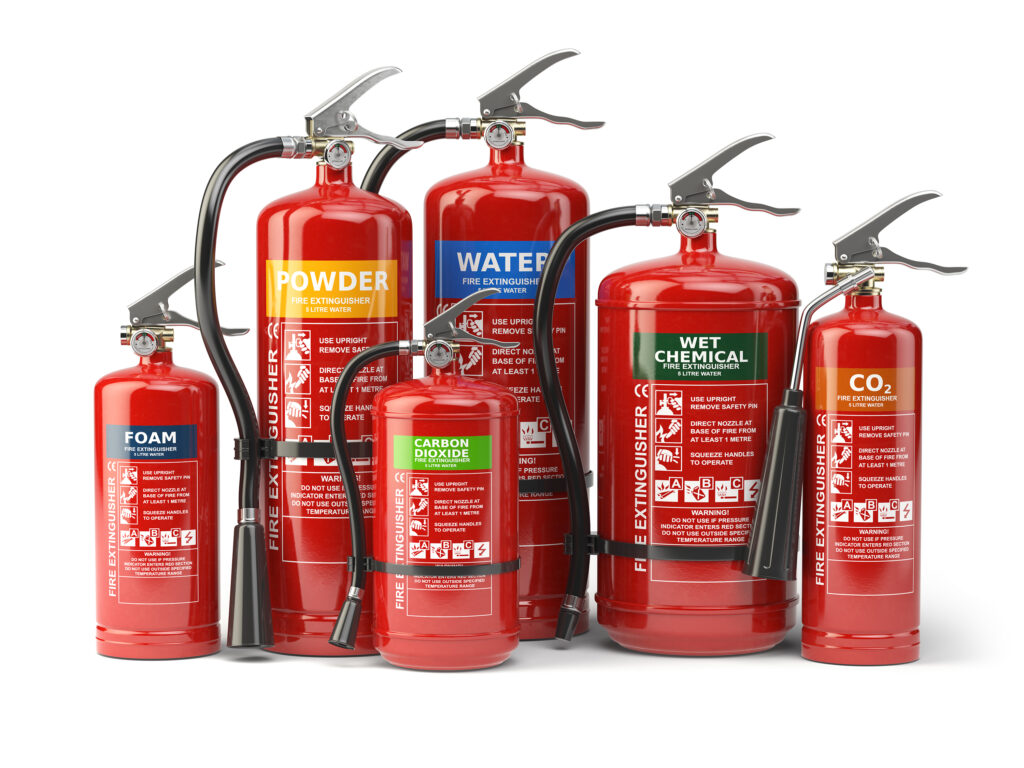
Which Fire Extinguisher Is Right for My Commercial Property?

Fire extinguishers in commercial buildings can save lives and minimize property damage. Every building owner and manager should equip their properties with portable fire extinguishers per local and federal regulations.
If you’re unsure what type and how many fire extinguishers your building needs, there are some vital considerations to keep in mind. For instance, while water is excellent at putting out many fires, it’s inadequate for electrical fires and can actually make them worse.
Choosing the correct fire extinguishers to keep people and assets safe is essential for fire and life safety.
Fire Extinguisher Classes
You should work with a trusted fire protection company to ensure you comply with the latest fire safety codes. Still, knowing your building’s fire risks and which type of fire extinguishers you need on hand is important.
Portable fire extinguishers are classified into five types based on the kind of fire they’re designed to put out:
Class A Fire Extinguishers
Class A fire extinguishers are designated for combustible fires fueled by common materials like wood, paper, rubber, cloth, and certain plastics. Depending on the materials involved, they use either a clean agent or water mist to suffocate and cool fires.
Class B Fire Extinguishers
Class B fires include flammable and combustible liquids like gasoline, alcohol, oil, lacquers, and grease. Class B fire extinguishers safely suppress these fires using carbon dioxide, a clean agent that suffocates and extinguishes the flames without leaving a residue.
Class C Fire Extinguishers
Class C fire classification applies to energized electrical equipment. Like Class B models, Class C fire extinguishers use carbon dioxide or another clean agent to suppress flames.
Class D Fire Extinguishers
Class D fire extinguishers are required for fires involving combustible metals like titanium, sodium, and magnesium. Class D fire extinguishers use a dry powder agent to suppress flames and absorb heat, as other agents can react with the fire and cause it to spread.
Class K Fire Extinguishers
Class K fires involve cooking equipment that uses animal or vegetable oils and fats. Class K fire extinguishers use a wet, potassium-based chemical agent to simultaneously cool and smother a kitchen fire.
Multipurpose Fire Extinguishers
Multi-purpose dry chemical or ABC fire extinguishers are safe for Class A, B, and C fires. They are electrically nonconductive and use a special chemical to suppress fires.
Choosing the Right Type of Fire Extinguisher for Your Industry
The National Fire Protection Association recommends that every building owner and manager install portable fire extinguishers for employees to use on non-growing fires confined to a small area or where smoke hasn’t filled the space.
Because there are so many different types of fires and fire extinguishers, consulting with a fire and life safety expert can be helpful when choosing suitable models for your business.
- Multifamily residential buildings typically require multipurpose extinguishers to cover the various types of fires that could break out. A fire protection company can ensure your apartment or condominium complex is stocked according to all applicable codes.
- Office buildings must meet a long list of NFPA codes. The three most common fire extinguishers in offices are water, foam, and carbon dioxide.
- Hotels and hospitality structures typically have a combination of every fire extinguisher classification, as they usually house electrical equipment, flammable liquids, combustible materials, commercial cooking equipment, and ordinary combustibles like wood and fabric.
- Restaurants always require Class K fire extinguishers so kitchen staff can quickly take action against small fires. ABC fire extinguishers throughout the rest of the restaurant ensure staff and guest safety.
- Retail stores typically require Class A fire extinguishers, though some may also need Class B equipment for flammable liquids fires.
- Automotive and industrial facilities can benefit from multipurpose dry chemical fire extinguishers that put out fires by interrupting chemical reactions.
- Educational, religious, and recreational spaces generally install ABC or multipurpose fire extinguishers. Most also purchase Class K extinguishers for kitchen and cafeteria fires involving cooking liquids like oils and fats.
- Healthcare and assisted living facilities require Class A, B, and C fire extinguishers, either separately or with multipurpose models. Buildings with kitchens should also install Class K extinguishers.
The Importance of Fire Extinguisher Maintenance in Commercial Buildings
Maintaining and recharging commercial fire extinguishers is essential to their performance in a fire emergency. The professionals at Foothill Fire Protection will conduct regular maintenance visits to your building or facility to:
- Ensure fire extinguishers are easily accessible in appropriate locations.
- Identify and repair any extinguisher problems.
- Check for proper sealing and legible tags.
- Recharge equipment as needed.
- Let you know when it’s time to replace your extinguishers.
To learn more about the different commercial fire extinguishers classifications and all the fire safety services we offer, including emergency repairs, call Foothill Fire Protection at (916) 663-3582 or contact us online.



